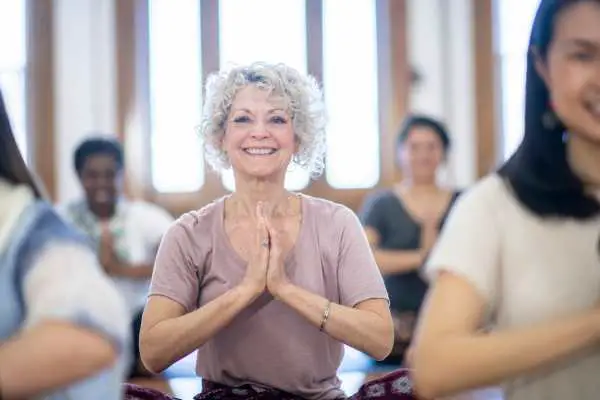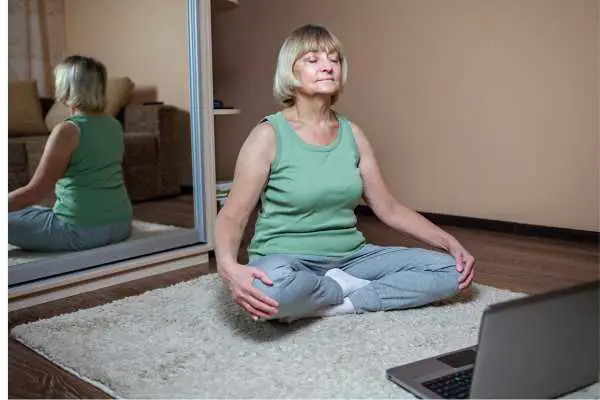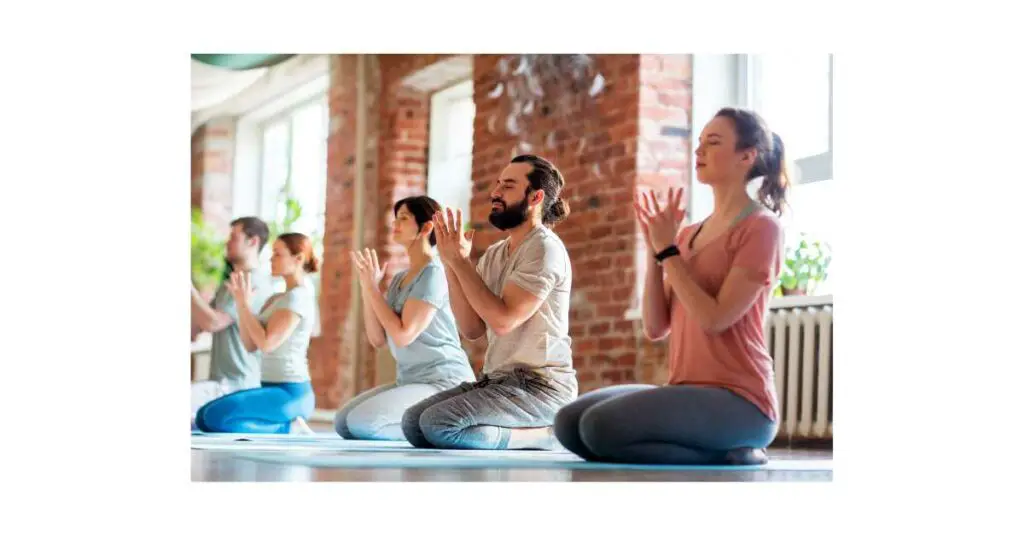Welcome, dear readers, to a topic that’s close to our hearts – the benefits of meditation for seniors!
First things first, let’s define what meditation is – it’s not just sitting cross-legged on a mountain top chanting “Om” (though that’s totally an option if you’re up for it!).
Meditation is a practice that can help you focus your mind and achieve a state of relaxation and peace. And let’s be real, who doesn’t need a bit of peace in their life?
Now, let’s talk about the aging population – statistics show that more and more people are living well into their 80s and 90s.
That’s fantastic news, but it also means we need to focus on promoting senior health and wellness. And what better way to do that than through meditation?
Meditation can be particularly helpful for seniors. As people age, they may experience more stress and anxiety due to physical limitations, health issues, and social isolation. Meditation can help seniors cope with these challenges and improve their overall well-being.
In this article, we’re going to cover everything you need to know about meditation for seniors. We’ll delve into the different types of meditation, the science behind it, and the specific benefits for seniors.
We’ll also discuss obstacles and provide tips for starting and maintaining a meditation practice.
So, buckle up and get ready to learn about a practice that can bring calm and tranquility to your golden years. Let’s get meditating!

What is meditation?
Meditation is a term that’s thrown around a lot these days, but what does it actually mean?
Essentially, meditation is a mental practice that involves training your mind to focus and quiet your thoughts.
It’s been around for centuries and has roots in many different cultures, including Buddhism, Hinduism, and Taoism.
There are several different types of meditation, each with its own unique approach and benefits. Some of the most common types of meditation include:
1. Mindfulness meditation
This type of meditation involves bringing your attention to the present moment and noticing your thoughts and feelings without judgment.
2. Loving-kindness meditation
This meditation involves cultivating feelings of love and kindness towards yourself and others.
3. Body scan meditation
This type of meditation involves scanning your body from head to toe, noticing any areas of tension or discomfort.
While meditation can benefit people of all ages, it’s particularly beneficial for seniors. In the next section, we’ll dive into the science behind meditation and aging.
The Science Behind Meditation and Aging
Let’s dive deeper into the science behind meditation and how its benefits seniors. Research has shown that practicing meditation can have a positive impact on cognitive function, emotional well-being, and physical health.
Studies have demonstrated that regular meditation practice can help improve memory and cognitive function in seniors.
The practice of mindfulness meditation, in particular, has been found to increase the size of the prefrontal cortex, which is responsible for decision-making, problem-solving, and other executive functions.
In addition, meditation has been shown to have a positive effect on emotional well-being.
As seniors age, they may experience more stress, anxiety, and depression. Practicing meditation can help reduce these negative emotions by calming the mind and reducing the physiological effects of stress on the body.
Furthermore, meditation has been found to have physical health benefits for seniors as well. Research has shown that meditation can reduce inflammation in the body, which is a common issue for seniors. Meditation has also been shown to have a positive effect on blood pressure and cardiovascular health.
The benefits of meditation on the aging brain and body can be attributed to its impact on the nervous system.
Meditation activates the parasympathetic nervous system, which is responsible for the “rest and digest” response. This helps to lower heart rate, blood pressure, and respiration rate, allowing the body to enter a state of relaxation and healing.
In summary, the scientific evidence clearly supports the use of meditation as a tool for promoting healthy aging. It has been shown to have a positive impact on cognitive function, emotional well-being, and physical health.
So, seniors, it’s time to give meditation a try and reap the benefits it has to offer!
How Does Meditation Help Seniors?
Meditation has numerous benefits for seniors. It can help reduce chronic pain, improve sleep quality, and enhance mental and emotional well-being.
Here are some of the specific ways in which meditation can help seniors:
1. Reducing chronic pain
Seniors are more likely to experience chronic pain, which can significantly impact their quality of life. Studies have shown that meditation can help reduce pain and improve overall physical function.
Meditation helps by changing the brain’s response to pain signals, resulting in less discomfort.
2. Improving mental health and emotional well-being
Seniors are also at risk of experiencing depression and anxiety, which can be debilitating. Meditation can help reduce symptoms of anxiety and depression by promoting feelings of calmness and relaxation.
It can also help seniors become more aware of their thoughts and emotions, allowing them to better manage negative feelings.
3. Feeling more connected and engaged with the world around them
As seniors age, they may experience feelings of loneliness and isolation.
Meditation can help seniors feel more connected to themselves and others by promoting a sense of inner peace and well-being.
It can also help seniors become more present in their daily lives, allowing them to appreciate the world around them.
4. Reducing Chronic Pain
Meditation has been shown to reduce chronic pain, including pain caused by arthritis and other age-related conditions.
By focusing on the mind and relaxing the body, seniors can reduce their perception of pain and improve their overall quality of life.
5. Improving Sleep Quality
Many seniors struggle with sleep issues, such as insomnia or disrupted sleep patterns. Meditation can help seniors relax and release stress, making it easier to fall asleep and stay asleep.
Regular meditation practice can lead to deeper, more restful sleep, which is crucial for overall health and well-being.
6. Enhancing Mental Health
Meditation can be a powerful tool for managing mental health conditions such as anxiety and depression, which can be common among seniors.
By training the mind to focus on the present moment, seniors can develop greater resilience and emotional stability. Regular meditation can also lead to improved mood and a greater sense of wellbeing.
7. Boosting Immunity
As we age, our immune system becomes less efficient, making us more susceptible to illness and disease.
Meditation has been shown to boost the immune system by reducing stress and promoting relaxation. This can help seniors stay healthy and reduce their risk of developing age-related conditions.
8. Increasing Brain Function
As we age, cognitive function can decline, leading to memory loss and other cognitive impairments. However, studies have shown that meditation can actually increase brain function and improve cognitive abilities.
By promoting neural plasticity and reducing inflammation in the brain, meditation can help seniors maintain their cognitive abilities and prevent cognitive decline.
Overall, the benefits of meditation for seniors are numerous and significant. By practicing meditation regularly, seniors can improve their physical, mental, and emotional health, and enjoy a greater sense of wellbeing in their golden years.

Improved Cognitive Function and Memory
Cognitive decline is a common issue that many seniors face as they age. It can include problems with memory, attention, and decision-making.
Fortunately, studies have shown that meditation can help improve cognitive function and memory in seniors.
Research suggests that meditation can increase the thickness of the prefrontal cortex, a part of the brain associated with decision-making and working memory.
Additionally, meditation has been shown to increase activity in the hippocampus, a region of the brain involved in memory formation.
One study found that seniors who practiced meditation regularly for eight weeks showed significant improvements in memory and attention compared to those who did not meditate.
Another study found that meditation improved cognitive flexibility and working memory in older adults with mild cognitive impairment.
If you’re a senior looking to improve your cognitive abilities through meditation, there are several techniques you can try.
One popular technique is focused attention meditation, which involves concentrating on a single point, such as your breath or a mantra, to improve your ability to sustain attention.
Another technique is open-monitoring meditation, which involves monitoring your thoughts and sensations without judgment to improve your awareness and cognitive flexibility.
Overall, meditation can be an effective way for seniors to improve their cognitive function and memory. By incorporating regular meditation into their daily routine, seniors can work to maintain their mental sharpness as they age.
Physical Benefits of Meditation for Seniors
As we age, it’s not uncommon to experience physical ailments such as arthritis, chronic pain, and other conditions that can impact our quality of life. Fortunately, meditation can be a valuable tool for managing these symptoms and improving overall physical health.
- One of the most significant physical benefits of meditation for seniors is pain reduction. Studies have shown that meditation can effectively reduce pain and inflammation, making it a useful tool for managing chronic conditions such as arthritis.
By focusing on their breath and cultivating a sense of relaxation and calm, seniors can experience less pain and discomfort in their daily lives.
- Meditation can also have a positive impact on cardiovascular health, lowering blood pressure and reducing the risk of heart disease. As we age, our risk of developing heart disease increases, making it essential to take steps to protect our cardiovascular health.
Meditation can be a simple yet effective way to do just that, helping seniors maintain healthy blood pressure levels and reduce their risk of heart attack or stroke.
In addition to these benefits, meditation can also improve balance and coordination, reducing the risk of falls and other injuries.
By promoting mindfulness and awareness of the body, seniors can better understand their physical limitations and move more mindfully, reducing the risk of accidents and injuries.
Overall, meditation can be a valuable tool for promoting physical health and well-being in seniors.
By reducing pain, improving cardiovascular health, and promoting better balance and coordination, seniors can live more active and fulfilling lives.

What Meditation Technique is Suitable for Seniors?
When it comes to meditation, there are several techniques to choose from, each with its own unique benefits. But with so many options, it can be overwhelming to decide which technique is best for seniors.
When choosing a meditation technique for seniors, it’s essential to consider their individual needs and abilities.
Some techniques may be more suitable than others, depending on factors such as mobility, cognitive ability, and overall health.
One of the most accessible and widely practiced forms of meditation is mindfulness meditation. This technique involves focusing on the present moment, being aware of your thoughts and feelings without judgment, and breathing deeply.
It’s a great starting point for seniors who are new to meditation and want to improve their mental and emotional well-being.
Another technique that can be beneficial for seniors is loving-kindness meditation. This practice involves cultivating feelings of love, kindness, and compassion towards oneself and others.
It can help seniors feel more connected and engaged with the world around them and reduce feelings of loneliness or isolation.
For seniors who experience physical pain or discomfort, body scan meditation can be a helpful technique.
This practice involves systematically scanning the body from head to toe, paying attention to any sensations or discomfort, and allowing those feelings to pass without judgment.
It’s important to note that some meditation techniques may not be suitable for seniors with certain health conditions. For example, seniors with uncontrolled high blood pressure or vertigo should avoid techniques that involve standing or moving, such as yoga-based meditation.
Ultimately, the best meditation technique for seniors is one that they feel comfortable and confident practicing regularly. It’s important to experiment with different techniques and find the one that resonates best with them.
Seniors can also consult with a meditation teacher or healthcare provider to help them choose a technique that meets their individual needs and goals.
Overcoming obstacles when meditating
Meditation can be challenging, especially for seniors who may have physical limitations or difficulty focusing. However, there are ways to overcome these obstacles and make meditation more accessible.
- One common obstacle is physical discomfort. Seniors may experience pain or stiffness in their joints, which can make it difficult to sit still for extended periods.
To overcome this, seniors can try using cushions or chairs to support their bodies and adjust their posture as needed. It’s also important to find a quiet and comfortable place to meditate, such as a peaceful corner in their home or a quiet park.
- Another obstacle is difficulty concentrating. Seniors may have trouble clearing their minds of distractions or may find it hard to focus on their breath.
To overcome this, seniors can try using guided meditations that provide verbal instructions and help them stay focused. They can also experiment with different types of meditation, such as visualization or loving-kindness, to find the one that resonates with them the most.
Finally, seniors may struggle to find the motivation to meditate regularly. To overcome this, they can try setting specific goals for their practice and rewarding themselves for reaching those goals.
They can also find a meditation buddy or join a group meditation to create a sense of accountability and support.
By overcoming these obstacles, seniors can make meditation a more accessible and enjoyable part of their daily routine.

Group Meditation for Seniors
Meditation can offer numerous benefits for seniors, including stress reduction, improved sleep, and enhanced cognitive function. While practicing meditation alone can be beneficial, practicing in a group setting can offer additional advantages.
In this section, we will explore the benefits of group meditation for seniors, the different types of group meditation, and some tips for seniors who want to join or start a meditation group.
Benefits of Practicing Meditation in a Group Setting
1. Increased Sense of Community
Meditation groups offer seniors the opportunity to connect with others who share a similar interest in mindfulness and inner peace.
This can help foster a sense of community and belonging, which can be especially important for seniors who may be feeling isolated.
2. Accountability and Motivation
Practicing meditation in a group can provide seniors with a sense of accountability and motivation to continue their practice.
When meditating alone, it can be easy to skip a session or become distracted.
However, in a group, seniors may be more likely to stay committed to their practice and motivated to continue.
3. Deeper Meditation
Meditating in a group can help seniors achieve a deeper level of meditation.
The collective energy of the group can create a powerful and supportive environment for meditation, making it easier to relax and let go.
Overview of Different Types of Group Meditation
There are several different types of group meditation, including guided meditation, silent meditation, and mantra meditation.
- Guided Meditation
Guided meditation involves a meditation teacher leading the group through a series of visualizations and mindfulness exercises.
This type of meditation can be helpful for beginners or seniors who may have difficulty quieting their minds.
- Silent Meditation
Silent meditation involves sitting in silence and focusing on the breath or a mantra.
This type of meditation can be especially effective for seniors who have some experience with meditation and are looking to deepen their practice.
- Mantra Meditation
Mantra meditation involves repeating a word or phrase, known as a mantra, to help quiet the mind and focus on the present moment.
This type of meditation can be helpful for seniors who have difficulty focusing during silent meditation.
Tips for Seniors Who Want to Join or Start a Meditation Group
- Research Meditation Groups in Your Area
Start by researching meditation groups in your area. Look for groups specifically geared towards seniors or those with experience working with seniors.
- Attend a Class or Group Session
Once you have identified a group that interests you, attend a class or group session to get a sense of the group’s style and energy.
- Consider Starting Your Own Group
If you are unable to find a group that meets your needs, consider starting your own meditation group. Reach out to friends, family members, or neighbors who may be interested in joining you.
- Be Patient and Consistent
Meditation takes practice, so be patient with yourself and consistent in your practice. Set aside time each day to meditate and commit to attending group sessions regularly.
Group meditation can offer many benefits for seniors, including a sense of community, accountability, and deeper meditation. With the variety of different types of group meditation available, seniors can find a style that works best for them. By following some simple tips and committing to a consistent practice, seniors can experience the many benefits that meditation has to offer.

Conclusion
Meditation is a powerful tool that can provide numerous benefits for seniors, including stress reduction, improved mental clarity, and physical health benefits.
The practice of meditation is simple and can be done by anyone, regardless of age or physical ability. With consistent practice, seniors can experience the benefits of meditation and improve their overall well-being.
In this article, we have discussed the various benefits of meditation for seniors, including stress reduction, improved mental clarity, and physical health benefits.
We have also explored different types of meditation practices, including mindfulness meditation, mantra meditation, and visualization meditation.
Additionally, we have provided tips for seniors who want to start a meditation practice, including finding a quiet and comfortable space, setting aside time for daily practice, and using guided meditation resources.
Lastly, we have discussed the benefits of group meditation for seniors, including a sense of community and support, increased motivation, and a deeper sense of relaxation.
In conclusion, meditation is a valuable practice that can provide significant benefits for seniors. With consistent practice, seniors can experience improved physical and mental health, reduced stress and anxiety, and an overall sense of well-being.
Whether practicing alone or in a group setting, seniors can use meditation as a tool for achieving a healthier and more fulfilling life.
Frequently Asked Questions
Can I meditate if I have mobility issues?
Yes, you can meditate if you have mobility issues.
You can meditate while sitting in a chair or even lying down. There are also meditation practices that involve movement, such as tai chi or qigong.
Does meditation reduce Ageing?
While meditation cannot completely reverse the aging process, some studies suggest that it may have anti-aging effects by reducing stress and inflammation in the body. Chronic stress and inflammation are both linked to cellular aging, which can lead to a variety of age-related diseases.
Regular meditation practice can help reduce stress levels and promote a sense of calm and relaxation, which may help slow down the aging process. However, more research is needed to fully understand the relationship between meditation and aging.
How much time meditation is beneficial?
The amount of time for meditation that is considered beneficial varies from person to person and also depends on the individual’s goals and level of experience. For beginners, it is often recommended to start with just a few minutes per day and gradually increase the duration over time.
Some studies have shown that even just 10 minutes of daily meditation can have benefits for mental and physical health.
However, other research suggests that longer meditation sessions of 20-30 minutes or more may be more effective in producing changes in the brain and reducing stress levels.










